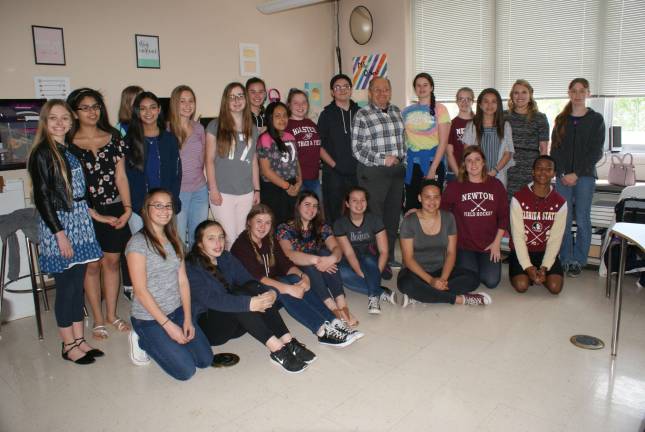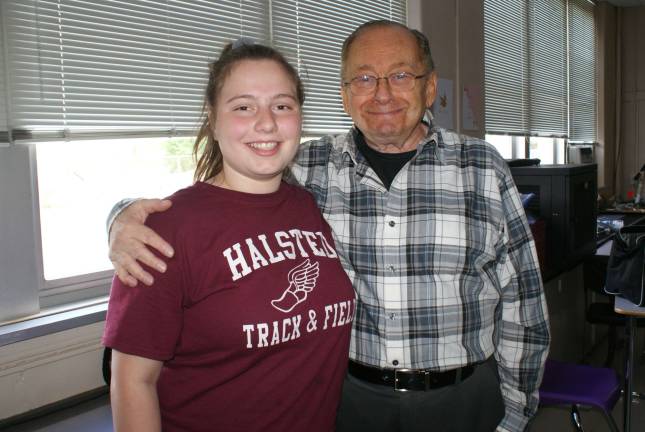Students hear hard truth from Holocaust survivor


BY Leslie Sullivan
“A year after our arrival in Budapest Hungary where my parents thought we would be safe, I was taken by Hungarian Nazi soldiers because I was foreign born,” Holocaust survivor Otto Salamon told a rapt auditorium of students, faculty and staff at Newton’s Halsted Middle School on May 3. “I was born in LeitMeritz, Czechoslovakia. This happened in 1941, I was not yet 7 years old. They transported me to an internment camp while they sorted out what to do with foreign-born people living in their country. 33 of us were prisoners, sent to a Jewish summer camp, and then put on a train guarded by armed Hungarian police called Nylias,
“The train stopped in Budapest on its way to an internment camp in Southern Slovakia. The station was filled with anxious parents who were pleading with Hungarian police to let us off the train. They refused. I saw my parents from the train car window where I was standing and yelled to them. When they heard me they ran to my train window. I remember begging them to take me off of the train. My mother ran over to one of the Nazi soldiers who was standing by the end door of my railroad car. I could see her pleading with him to let me off the train. He waved her off with a bayonetted rifle he was holding in his hand. My parents stood in front of my train window looking up to me helplessly. I then heard the sound of a locomotive whistle and our train began to roll of out the station. My parents started to half walk, half run on the side of my moving train car. ‘I promise to bring you back,’ I heard my mother yell up to me.”
Salamon’s heart-wrenching story to the students was made possible by Halsted’s Altitude Club. Altitude is an empowerment program for 8th grade students and a community health initiative of Newton Medical Center. Partnering with leaders in the community to deliver a robust empowerment program to 8th graders within Sussex County, Altitude provides students with a program that spans their entire school year, encouraging students from diverse backgrounds to recognize the hidden similarities between them. Altitude participants find themselves connecting to their peers in positive and enriching ways while connecting to the schools and communities in which they thrive.
“I currently run Altitude clubs at Sparta Middle School, Halsted Middle School, Green Hills Elementary, Sussex Tech. Charter School, Long Pond Elementary, Franklin Elementary and Pope John High School. All of these groups are 8th graders,” said Anna Gunderson, who is also a staff member of Pass It Along, the local, non-profit social action organization for teenagers, which encourages young people to give back to their community.
Pass It Along, according to its website, is committed to helping teenagers become confident, resilient and compassionate through self-discovery, volunteerism and leadership. The Altitude Clubs aim to create service projects in the community and prepare students for their high school years where they are better able to make positive choices toward becoming their best and highest selves, while becoming enthusiastic contributors to their schools, to their community, and to each other.
The intentions of the two groups dovetailed perfectly as regards bringing Salamon to the school.
“Halsted's Altitude service club was brainstorming what they wanted to do for their community,” Gunderson said. “One day a student, Gia Chavarria, asked if we could also host a Holocaust speaker at their school. Luckily, I knew someone who may be willing to share his story.”
“I’ve always wanted to have the opportunity to meet someone who survived the Holocaust,” said Chavarria, 14, of Newton.
Chavarria and fellow students have been covering the Holocaust in their Language Arts classes. Reading ‘Devils of Arithmetic’ reinforced Gia’s interest, and ultimately she brought the idea to the Altitude group.
Otto Salamon is the father of Sparta resident, Erika Lupo, whom Gunderson knows.
“Erika had lent me her father's Holocaust memoir. After reaching out to him, Mr. Salamon immediately agreed to speak at Halsted Middle School. I met with Otto on a Sunday morning, and when I thanked him for his time and willingness to share his story, he said that as this generation is aging, he feels compelled to share his story — that it is his duty,” Gunderson said. Salamon is an award winning author and producer. His memoir, ‘Dodging Death: A Family on the Run,’ encompasses much of what he spoke about at the middle school — deadly bombs, anti-Semitism, and the escapes from death he and his family made. Salamon was only 11 years old as the war came to an end, his childhood stripped from him.
The excitement was palpable as Gia Chavarria met Otto Salamon. And that excitement turned to empathy, sorrow and confusion as he spoke to the crowd of wide-eyed students.
“And when the train began to pick up speed…she couldn’t. She reluctantly stopped running and raised her hand to wave goodbye to me. I waved back. My dad kept up with the moving train, struggling to get his hands in his coat pocket and holding up a handful of change. He yelled up to me, ‘take it, take it!’ I did. I saw him stop running. He turned around and slowly walked back to where my mother was standing. The last sight I saw was seeing him put an arm around her shoulder.
"We reached the internment camp where we were guarded by armed Hungarian police who were seen manning machine guns. For months I searched for my mother near a wire fence and then one day I saw a black car pull up to the guards' gate and my mother emerged from it, holding a bunch of documents in her hand. A Nylias rushed up to the gate to investigate. My mother showed him the documents she was holding. In response he rifle-butted her to the ground. And then emerging from the same car, a man with a shiny object in his hand – it must have been some kind of government badge. The Nylias quickly lowered his rifle and helped my mother get back on her feet. Before I knew it, another guard came for me and took me out of the camp to where my mother and that man were standing. She put an arm around my shoulder and whispered in my ear ‘I told you I was going to come and get you.’ I do remember my mother once telling me that most of the children who were taken to the internment camp with me were never heard from again.”
Salamon's message is deeply connected to the message of Pass It Along: acceptance, inclusion and respect for every human being.
“When I came to this country I realized I had a flawed childhood, I came having this sense of wanting to belong and I was eager to belong to my new country. I did not belong during the holocaust, I did not belong, I was always a foreigner and also I was targeted because of my religion, so I always felt vulnerable and scared. In fact each morning I would get up and the first thought that came to mind as the war progressed was will I survive the end of the day,” Salamon said.
One student asked: “Why would they do that? Why would people be so evil?”
“For the same reason that we witness today,” Salamon replied. “We witness a certain amount of hatred and divisiveness today. And that’s one of the reasons I talk, not because I am a Jew but because what I learned is that I am willing to accept anyone and everyone in my life and there is a certain amount of intolerance today and there shouldn’t be. As old as I am it is still with me and there are days that I still dream of it. It never leaves, like any other traumatic experience.”